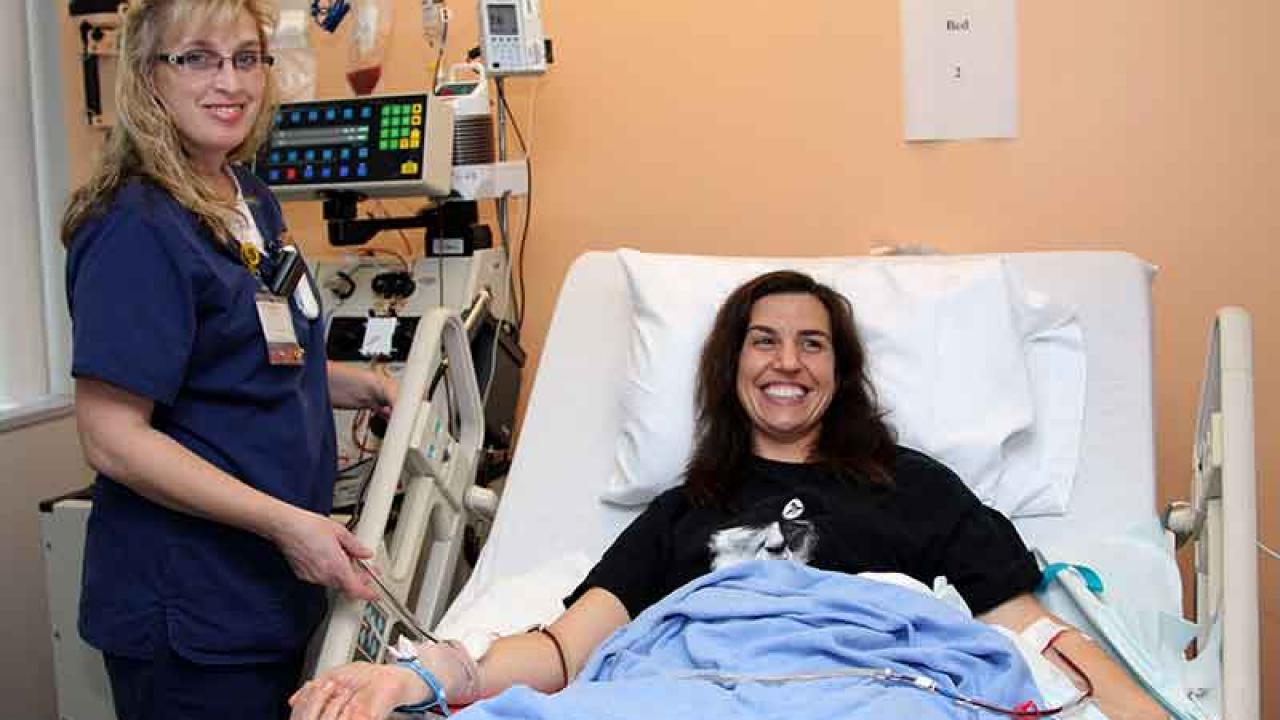SACRAMENTO — Anonymous blood donors helped extend her father’s life, and now she’s hoping she can do the same for someone she’s never met.
Joanna Friesner, who works at the Agricultural Sustainability Institute, spent much of Monday (Dec. 8) at the UC Davis Medical Center, having stem cells pulled from her blood to donate to a leukemia patient in another country. The procedure is a painless, noninvasive alternative to donating bone marrow, and Friesner was back at work today.
She signed up with the National Marrow Donor Program's Be the Match registry more than 20 years ago, and recently was identified as a match with a middle-aged man whose identity she is not allowed to know.
“It’s really not about me in the end,” she said while lying in a hospital bed, with tubes connected to both arms. “Just knowing that I’m helping is enough. I don’t have to know how he’s doing.”
The UC Davis Comprehensive Cancer Center collected Friesner’s stem cells. It performed the region’s first bone marrow transplant in 1993, and serves as an official transplant center for the National Marrow Donor Program.
Family history
Friesner has been a regular blood and platelet donor for as long as she has been able, a passion sparked when her father received a donation that she credits with extending his life. When she was 13, her father was diagnosed with colorectal cancer and was given six months to live. Through a clinical trial at UC San Francisco that included blood transfusions, he lived almost three more years.
“I will always be grateful to the anonymous people who donated to my dad,” she said.
Friesner recalled asking her high school science teacher why her father had developed cancer. Was it the food he ate? Did he inherit it? That curiosity led her to study human genetics at UC Berkeley and plant genetics as a graduate student at UC Davis. She earned her Ph.D. in 2004, worked as a postdoc for several years, and is now national coordinator of the Inter-institutional Network for Food, Agriculture and Sustainability at the Agricultural Sustainability Institute.
She’s a strong advocate for donating blood — which she sees as her own renewable resource — and is hoping her story will encourage others to join the National Marrow Donor Program.
“If you have the chance to potentially save someone’s life with low risk to yourself — I couldn’t say no.”
No surgery
Friesner said she thinks many people may be scared away from registering because they think the process of donating is a painful procedure; there are times when bone marrow is taken through surgery, but most donations are like Friesner’s, which she likened to “a seven-hour blood donation.”
For several days prior to the donation, she received medication to elevate her stem cell level. On the day of, she caught up on some reading as her blood cycled through a COBE Spectra Apheresis System. Slowly, the machine separated her stem cells from her blood, and a deep red liquid filled a bag.
A courier arrived late in the day to pick up the bag and fly with it to the recipient, who was undergoing chemotherapy while the donation was underway, leaving him with little or no bone marrow or white blood cells.
Friesner’s stem cells were to be transplanted into his body, where they will set to their task of creating new blood, and — if all goes well — leave him in remission.
How to register
To join the bone marrow registry, all you need to do is provide a swab from the inside of your cheek. You can do this at blood drives that are held regularly on campus, or at any BloodSource collection center. More information is available here on the BloodSource website, or by calling (916) 453-3797.
Follow Dateline UC Davis on Twitter.
Media Resources
Dave Jones, Dateline, 530-752-6556, dljones@ucdavis.edu
